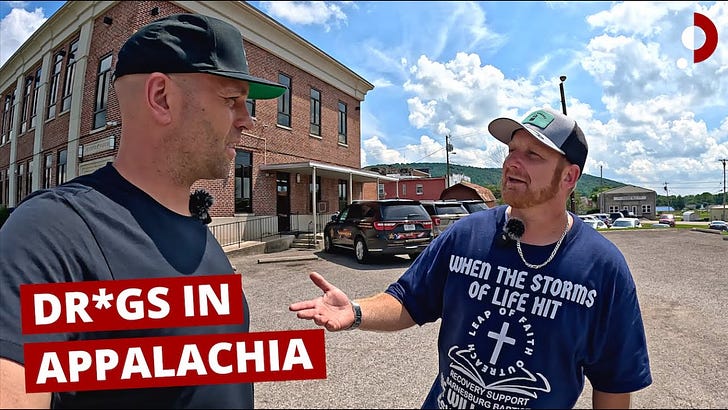Bored and drugged to death
Anywhere in America, you can find dope in 30 minutes. But you can also find hope.
Statistically, you’ve got close to a coin flip chance of your family being affected by drug addiction. That means you probably know a family, coworker, or friend who’s affected by the flood of fentanyl, meth, and other narcotics drowning our country.
I won’t say too much more here: I’ve written about suicide, which is frequently the end for people who feel their lives are irretrievably ruined by drug addition. My own family has been scarred by it. I’ve seen that where seeds die, hope springs.
The video I’m sharing below details the struggle families in Appalachia have with addition, and breaking free. It’s quite long, nearly 90 minutes, but worth watching. The themes that permeate this story come up again and again. People—especially young people—make poor choices, driven by boredom, lack of economic or educational opportunity, running with a bad crowd, or sometimes their own family has raised them in drug abuse.
Lives become intertwined with the need to obtain more drugs, and that means crime. Law enforcement can’t stop it; they can only recycle abusers through an overloaded (and many times, corrupt) system where in jail addicts can get whatever they need. Doctors prescribe “feel good” pills to address real illness, but these are also abused, addictive, and sold to addicts on the market. Cheap drugs flood over our borders, produced at scale in factories that rival giant commercial producers.
One statistic quoted in the video is that a certain narcotic used to sell for $2,000 per ounce just seven years ago. The sheriff said it now sells for $250 an ounce. A recovering addict corrected him: it’s $125. That means the average welfare recipient can buy several ounces a month, pay the government-assisted rent, call their dealer with a government-provided cellphone, use government-provided WiFi, and still afford to eat. Homelessness is really a choice in this country. Skid Row residents are there because they want to be.
Recovery is available, anywhere in Kentucky, including the hills and hollers, within 30 minutes, one outreach member said. Personally, knowing others involved in this work, I believe that’s true just about anywhere in America. In my old town of Warner Robins, Georgia, the church I attended there has hundreds of people come to recovery meetings every week—sometimes up 700 in a single meeting. Warner Robins is far from a drug haven or an Appalachian mining town. Organizations like Leap of Faith Outreach and The Next Chapter, featured in the video, stand ready to meet those who want help, anywhere, anytime. There are similar organizations around the country. But our prisons, streets and morgues are still filled with the bored and drugged to death in America.
The causes are too complex to discuss here. One place to start might be with Jonah Goldberg’s latest G-File: “In Defense of Manly Tears.” In the video, one former addict dispenses the truth, that the three hardest words a man can ever speak is “I need help.”
Here’s the video. If you want to support Leap of Faith Outreach, you can donate here.
If you or a loved one needs help and is ready to ask, visit help.org, or call one of the organizations below.
National Drug Helpline
The National Drug Helpline is open to any individual dealing with addiction issues, including family members and other loved ones. Resources are available for those struggling with any addictive substance, including alcohol, and professionals are available to help 24/7/365 at 1-844-289-0879.
National Suicide Prevention Lifeline
The National Suicide Prevention Lifeline exists to help people feeling suicidal find the help they’re looking for. The lifeline also has resources to assist people with addiction issues to find help. Callers can reach the lifeline at any time of the day or night at 1-800-273-TALK (8255), or 1-800-799-4889 for TTY users. Spanish-language services are available by calling 1-888-628-9454. Online chat is also available.
SAMHSA’s National Helpline
The Substance Abuse and Mental Health Services Administration (SAMHSA) operates a 24/7/365 hotline that refers callers to mental health and substance abuse resources in their area. All programs recommended by SAMHSA meet federal guidelines for assisting people with mental health and addiction disorders, and all inquiries are kept strictly confidential. Spanish services are available, as are English services, by calling 1-800-662-HELP (4357), or 1-800-487-4889 for TTY users. SAMHSA also operates an online treatment locator tool people can use to find addiction and mental health assistance nearby.





So true.